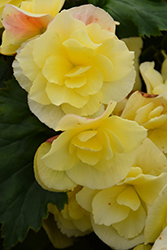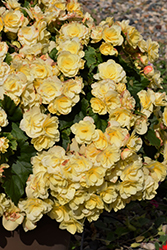It's all about ...
plants

Solenia® Yellow Begonia
Begonia x hiemalis 'Solenia Yellow'
Height: 12 inches
Spacing: 10 inches
Sunlight:
![]()
![]()
![]()
Hardiness Zone: (annual)
Other Names: Hiemalis Begonia
Group/Class: Rieger Begonia
Description:
A beautiful, floriferous variety, producing large yellow double blooms all season, over glossy, vigorous green foliage; deadheading not necessary; great for containers and hanging baskets
Ornamental Features
Solenia® Yellow Begonia features showy yellow frilly flowers at the ends of the stems from mid spring to mid fall. Its succulent heart-shaped leaves remain green in colour throughout the year.
Landscape Attributes
Solenia® Yellow Begonia is an herbaceous annual with a mounded form. Its medium texture blends into the garden, but can always be balanced by a couple of finer or coarser plants for an effective composition.
This is a high maintenance plant that will require regular care and upkeep, and usually looks its best without pruning, although it will tolerate pruning. Deer don't particularly care for this plant and will usually leave it alone in favor of tastier treats. Gardeners should be aware of the following characteristic(s) that may warrant special consideration;
- Insects
- Disease
Solenia® Yellow Begonia is recommended for the following landscape applications;
- Mass Planting
- Border Edging
- General Garden Use
- Container Planting
- Hanging Baskets
Planting & Growing
Solenia® Yellow Begonia will grow to be about 12 inches tall at maturity, with a spread of 12 inches. When grown in masses or used as a bedding plant, individual plants should be spaced approximately 10 inches apart. Its foliage tends to remain dense right to the ground, not requiring facer plants in front. The flower stalks can be weak and so it may require staking in exposed sites or excessively rich soils. Although it's not a true annual, this plant can be expected to behave as an annual in our climate if left outdoors over the winter, usually needing replacement the following year. As such, gardeners should take into consideration that it will perform differently than it would in its native habitat.
This plant performs well in both full sun and full shade. However, you may want to keep it away from hot, dry locations that receive direct afternoon sun or which get reflected sunlight, such as against the south side of a white wall. It requires an evenly moist well-drained soil for optimal growth, but will die in standing water. It is not particular as to soil pH, but grows best in rich soils. It is somewhat tolerant of urban pollution, and will benefit from being planted in a relatively sheltered location. Consider applying a thick mulch around the root zone over the growing season to conserve soil moisture. This particular variety is an interspecific hybrid. It can be propagated by cuttings; however, as a cultivated variety, be aware that it may be subject to certain restrictions or prohibitions on propagation.
Solenia® Yellow Begonia is a fine choice for the garden, but it is also a good selection for planting in outdoor containers and hanging baskets. It is often used as a 'filler' in the 'spiller-thriller-filler' container combination, providing a mass of flowers against which the thriller plants stand out. Note that when growing plants in outdoor containers and baskets, they may require more frequent waterings than they would in the yard or garden.

